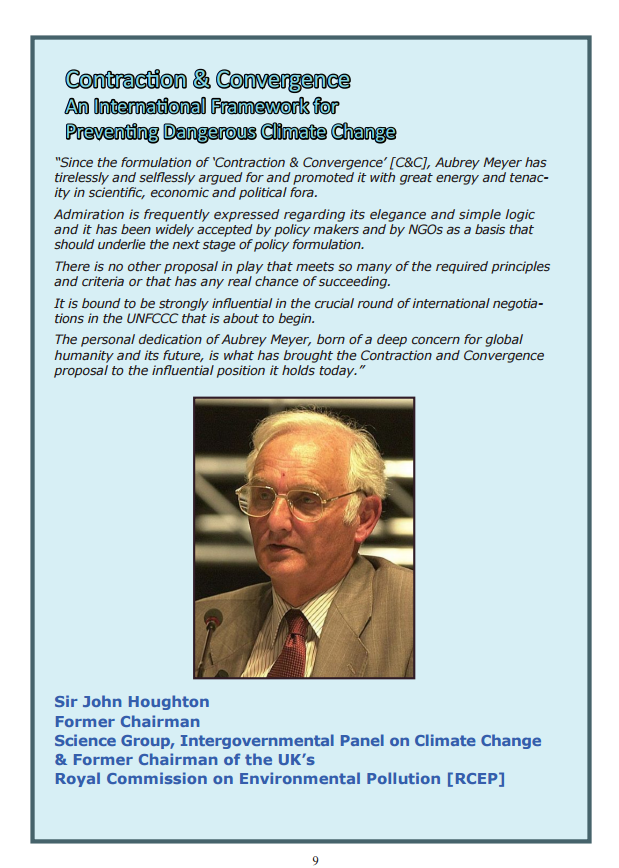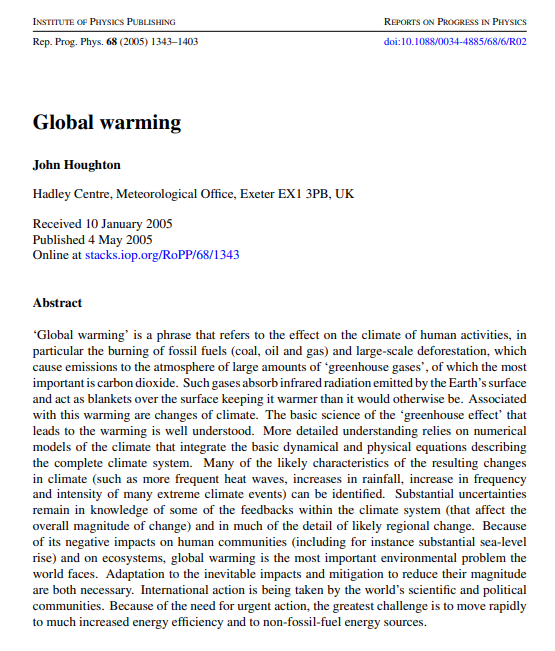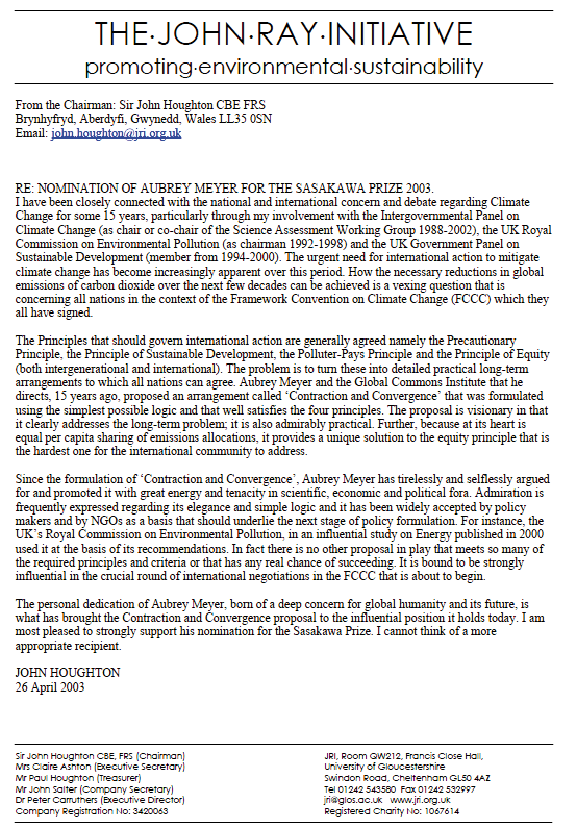Sir John Houghton
John died on 15 April, aged 88. His life was lost to the coronavirus pandemic, a global issue that requires serious
and immediate collective action. He spent his life advocating just such a response to climate change.
He was one of the early founders of the IPCC (1998) and was chairman of WG1 by the time of Mrs Thantcher's
famous address to to the UN General Assembley in 1990.
He was widely loved and his work was widely admired.
He is very much missed.
Obituary in Nature.
This page has been slightly updated in October 2025.
**************************************
Thank you Aubrey.
I am happy to support your proposal to the UNFCCC.
Best regards
John
Sir John Hougton
Former Chair of IPCC Working Group One
Chairman of the John Ray Initiative

He was also on the Royal Commission on Environmental Pollution (RCEP) around 1999/2000 when they adopted C&C.

"An example of how the approach to stabilisation for carbon dioxide might be achieved is a proposal called 'Contraction and Convergence' that originates with GCI, a non-governmental organisation based in the UK."
Global Warming; Complete Guide
J Houghton on C&C

"Since the formulation of ‘Contraction and Convergence’, Aubrey Meyer has tirelessly and selflessly argued for and promoted it with great energy and tenacity in scientific, economic and political fora. Admiration is frequently expressed regarding its elegance and simple logic and it has been widely accepted by policy makers and by NGOs as a basis that should underlie the next stage of policy formulation.
For instance, the UK’s Royal Commission on Environmental Pollution, in an influential study on Energy published in 2000 used it at the basis of its recommendations. In fact there is no other proposal in play that meets so many of the required principles and criteria or that has any real chance of succeeding. It is bound to be strongly influential in the crucial round of international negotiations in the FCCC that is about to begin.
The personal dedication of Aubrey Meyer, born of a deep concern for global humanity and its future, is what has brought the Contraction and Convergence proposal to the influential position it holds today."

An extended
scientific essay on the science of global warming and the politics of
Contraction & Convergence by Sir John Houghton, published by the Insitute of Physics.

We often talk of the ‘global commons’ meaning for example air, oceans or Antarctica – by definition these are ‘commons’ to be shared. But more ‘commons’ need to be identified. For instance, there are respects in which Land should be treated as a resource to be shared or fish and other marine resources. Or, in order for international action regarding climate change to be pursued, how are allowable emissions from fossil fuel burning or from deforestation to be allocated? How do we as a world share these natural resources between us and especially between the very rich – like ourselves - and the very poor?
A proposal by the Global Commons Institute is that emissions should first be allocated to everybody in the world equally per capita, then transfer of allocations being allowed through trading between nations. The logic and the basic equity of this proposal is in principle quite compelling – but is it achievable? Sustainability will never be achieved without a great deal more sharing. Sharing is an important Christian principle that needs to be worked out in practice. John the Baptist preached about sharing (Luke 3 v11), Jesus talked about sharing (Luke 12 v33), the early church were prepared to share everything (Acts 4 v32) and Paul advocated it (2 Cor 8 v13-15). The opposite of sharing - greed and covetousness - is condemned throughout 11 scripture. The sharing of knowledge and skills with those in the third world is also an important responsibility.
These new attitudes are not just to provide guidance to policy makers in government or elsewhere. They need to be espoused by the public at large. Otherwise government will not possess the confidence to act. For the public to take them on board, the public have to under-stand them. To understand, they have to be informed. There is a great need for accurate and understandable information to be propagated about all aspects of sustainability. Christian churches could play a significant role in this.
Global Warming Climate Change and Sustainability
John Ray Initiative
"Contraction and Convergence is a prime example of a UNFCCC-compliant Global Climate Change Framework. It is a rational formulation for reconciliation of 'Climate Justice without Vengeance'. Several ideas derived from C&C have surfaced since Kyoto with ideas that can be perhaps in various ways incorporated into C&C. However, there is an overwhelming need for an over-arching UNFCCC-compliant Framework that enables the globally competing interests of the over-consuming and the under-consuming to be reconciled with each other and with the objective of the UNFCCC in a non-random manner. We feel that C&C is the veteran and indeed the apex example of this and urge you to consider our request. At Kyoto in December 1997 and shortly before they withdrew from these negotiations, the USA stated, “C&C contains elements for the next agreement that we may ultimately all seek to engage in.” The adversarial reasons for their withdrawal then were in play again at COP-15: - http://www.gci.org.uk/public/COP_15_C&C.swf C&C answers this in a unifying and constitutional way and the need for this answer becomes increasingly critical." Letter and signatories at: - http://www.gci.org.uk/politics.html
President, John Ray Initiative
The Rt Revd & Rt Hon Richard Chartres KCVO DD FSA
Bishop of London

The personal dedication of Aubrey Meyer, born of a deep concern for global humanity and its future, is what has brought the Contraction and Convergence proposal to the influential position it holds today. I am most pleased to strongly support his nomination for the Sasakawa Prize. I cannot think of a more appropriate recipient.
John Hougton
Chairman John Ray Initiative
I support the nomination of Aubrey Meyer. Over the past fifteen years he has developed the idea of Contraction and Convergence as an international solution to the challenge of global warming and climate change. He has done this through the Global Commons Institute with very little funding and infrastructure. These ideas influenced the Royal Commission on Environmental Pollution in the development of its report “Energy: the Changing Climate” and Contraction and Convergence was the basis of the recommended 60% reduction in carbon emissions. This recommendation has been taken up by the government in its recent Energy White Paper and is now the generally accepted basis for policy by a range of government, industry and NGOS. He is a visionary and the award of the Sasakawa Prize would give much support to this very important work, and be a splendid recognition ofhis important contributions.
Sir Tom Blundell,
Chairman, Royal Commission on Environmental Pollution.
If ever there was an initiative that deserved recognition and support, it is the brilliant and relentless campaign waged by this fiercely independent, creative and apparently quite tireless individual.
Michael Meacher
UK Minister of the Environment
I want to support the nomination of Aubrey Meyer for the Sassakawa prize. If this award is about people and institutions that make a real difference then he should be recognised by it. In 50 years time we will talk of Meyer’s principle much as we talk about the Kyoto agreements now.
Richard Sandbrook
A UNEP global 500 award winner, co-founder of Friends of the Earth and Director of IIED 1988- 1999
